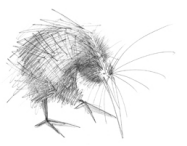Kiwi Population Grows to 400
We thought it was time for a brief update on the Whangarei Heads Landcare Forum kiwi recovery project – “Backyard Kiwi”.
Great start to kiwi breeding season
It has been an excellent breeding season to date, largely due to the good rainfall experienced last autumn. We continue to monitor a sample of 10 kiwi with radio transmitters and 4 of those kiwi males have hatched 6 chicks between them already. There is another monitored kiwi dad still nesting and two others have started nesting on a second round of eggs – this is our most successful start to the breeding season since monitoring started in 2003.
Kiwi population grows to 400
The official kiwi call count carried out at 21 listening sites during the winter months identified 189 individual kiwi and considering that the listen sites cover less than half the area of the Whangarei Heads our estimation of a kiwi population of around 400 through population modeling looks pretty good! The estimated kiwi population of the Whangarei Heads was only 80 adults ten years ago so we can all be proud of the great progress being made.
Predator trapping continues through NRC funding
For the past 10 years we have run a trapping network to reduce kiwi predator numbers at the Heads. Without this predator control over 90% of kiwi chicks would be killed – mainly by stoats. Also any ferrets present can not only kill chicks but also adult kiwi. Every season there is an influx of new predators reinvading the area so it is fantastic that the Northland Regional Council has funded the continuation of the trapping program for the next 5 years through their Community Pest Control Area (CPCA) budget. This NRC funding covers trapping and also importantly a controlled toxin pulse in some areas that may have trap shy animals present. We are very grateful for the NRC support and are determined to show that the Backyard Kiwi work is great value for the rate payers’ money.
BNZSTK Operation Nest Egg
Since 2003 we have been fortunate to be able to supplement the Heads kiwi population with extra young kiwi through a BNZSTK Operation Nest Egg program that involves transferring young kiwi chicks from the Department of Conservation managed areas of Purua, Rarewarewa and Riponui (west of Whangarei). These chicks are transferred to the Limestone/Matakohe Island kiwi crèche to grow to 1200g in weight before being released at the Heads. This year 7 kiwi have been released at the Heads, these releases are our best opportunity for the people of the Whangarei Heads and wider area to see a kiwi up close and personal in their backyard. Over 600 people have had that fantastic experience this season – “seeing is believing” and when linked with the ongoing radio transmitter monitoring of some of the released birds locals really do get to gain an understanding of their kiwi in their backyard. The BNZ Save the Kiwi Trust has once again provided funding to support this program and we have already transferred 10 young kiwi chicks into the safe hands of the Limestone/Matakohe Island Rangers from the new season’s nests at Rarewarewa and Riponui.
Community Engagement with Backyard Kiwi
Without the support of the wider community at the Whangarei Heads it would be impossible to continue the successful kiwi recovery work of the Whangarei Heads Landcare Forum. Uncontrolled dogs still remain the biggest threat to the kiwi population and the responsible dog control by the majority of pet owners is heartening to see. Although dog kills have reduced in the past few years 2 adult kiwi were unfortunately recently killed by dogs on the roadside at the Nook. Another adult kiwi was also run over by night time traffic. In a major effort to inform locals and visitors of kiwi at the Heads the “Backyard Kiwi” road and interpretation signs have been erected. Our website www.backyardkiwi.org.nz has updates on the monitored kiwi and other local kiwi news.
Locals Trapping for Success
In conjunction with the NZ Landcare Trust we are running a local trapper’s day on Sunday the 13th of November. This will look at protecting what is in your backyard from possums and mustelids. Both experienced trappers and novices should get something from the event — see details under trapping news.



